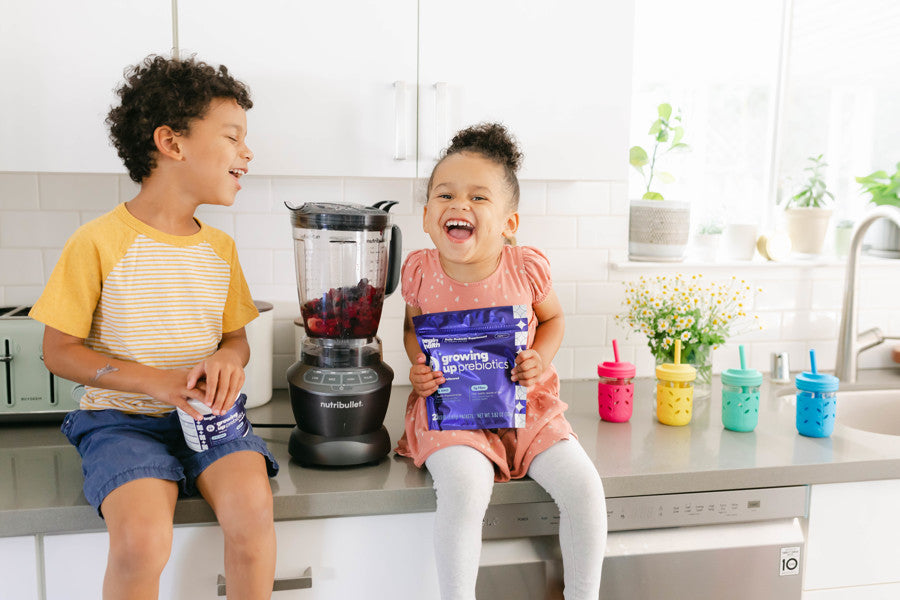Your Cart is Empty
Continue shopping5 Reasons Why Prebiotic Fiber is Essential for Kids' Gut Health and Supporting Constipation
Medically Reviewed by May Zhu, RDN | Published August 15, 2023
share this article

A happy tummy and good digestion is vital for our kiddos’ overall health and well-being. Maintaining a healthy gut is essential to support their growth and development, as well as supporting symptoms from digestive issues such as constipation. One key ingredient that can be a part of the toolbox for a balanced gut in our kiddos is prebiotic fiber. We created Growing Up Prebiotics here at Begin Health to help support our little one’s digestive health by making their poops softer and easier [1]. Let’s explore five reasons why prebiotic fiber is essential for kids' gut health and how it can be part of your little one’s strategy for constipation support.
Nourishment for the Gut Microbiome
Prebiotic fiber refers to indigestible plant fibers that act as nutrients for the beneficial bacteria living in our gut. By nourishing these friendly microbes, prebiotic fiber helps these microbes thrive and maintain a balanced gut microbiome. A balanced microbiome is important for optimal digestion, nutrient absorption, and immune function [7,8].
Promotes Softer and Regular Bowel Movements
Studies have shown that up to 30% of kids struggle with functional constipation [2]. Evidence from several studies have clearly shown the association between a low-fiber diet and functional constipation [3,4,5].
Prebiotics can help support constipation by increasing the production of short-chain fatty acids in the gut, which are produced during fermentation of fiber in the stomach. These fatty acids help in the absorption of water and soften stools to promote easier poops and more frequent bowel movements [6].
Additionally, clinical research on the prebiotics in chicory root fiber, an ingredient we use in our Growing Up Prebiotics also demonstrates an increase in stooling frequency, a softer consistency, and a decrease in stooling pain in six weeks with daily, consistent use in kids [1].
Daily reads to help your little ones lead happier and healthier lives.
Buy Now
Join the
Happy Gut Club
Boosts Beneficial Gut Bacteria
Adding prebiotics in your kiddos diet helps stimulate the growth of beneficial bacteria like Bifidobacteria and Lactobacilli, two of the most frequently studied strains of probiotics in kids [7]. Studies have shown the positive health effects of prebiotic fiber on the increase of Bifidobacteria for the development of a healthy microbiome in infants. Lower levels of bifidobacteria in infants has been shown to increase the prevalence of obesity, diabetes, and metabolic disorder later in life [9].
Supports the Immune System
Did you know that 70% of our immune system lives in the gut [10]? Research has shown the differences between the microbiome composition between healthy kids and kids that struggle with atopic diseases, such as eczema, suggesting that reduced bacterial diversity and dysbiosis is associated with the development of atopic diseases [11,12].
Dietary fiber intake provides similar health benefits for kids as for adults, and prebiotic fibers may help enhance immune function [13]. The addition of prebiotic fibers in the diet can support our kiddos’ overall health and immunity.
Improves Digestive Health and Gut Diversity in Infants, Toddlers, and Kids
Studies show that adding a prebiotic fiber called inulin into the diets of infants, toddlers, and kids can support improvement of the gut microbiome composition. The gut microbiome is influenced by the balance of both probiotics and prebiotics in the gut. Our Begin Health Growing Up Prebiotics contains chicory root fiber, which is a source of inulin and can serve as nourishment for kids’ guts, with research showing supportive digestive health effects [1,14,15]. These studies also find that the consumption of prebiotics such as inulin is safe for our little ones to use on a daily, consistent basis [1].
Encouraging a Varied Diet
Prebiotics are found in a variety of foods, including fruits, vegetables, and legumes. For more ideas on sources of prebiotic fiber, check out our blog on the Top Sources of Prebiotics for Kids. Including these fiber-rich foods in your kid’s diet encourages them to consume a diverse range of nutrients that helps naturally feed their gut microbiome. However, it can be challenging for kids, especially pickier eaters to get sufficient prebiotics through diet alone. Prebiotic supplements, such as Begin Health’s Growing Up Prebiotics can be beneficial as a way to boost your little one’s fiber intake.
Summary
Prioritizing your kiddos’ gut health is essential for their overall well-being and prebiotics play a crucial role in maintaining a healthy digestive system. Prebiotics can help promote the growth of friendly gut bacteria, support immunity, and support constipation through softer stooling. Include a variety of prebiotic-rich foods in your kid’s diet to diversify their fiber intake and consider incorporating a kids’ prebiotic supplement like our Growing Up Prebiotics to support a happy and balanced gut.

Author
May Zhu, RDN
Trending

Why Parents Are Choosing Prebiotics Over Stool Softeners for Kids
read now
Oxalates and Kids' Digestion: How High-Oxalate Foods Contribute to Constipation and Gut Discomfort
read now
5 Signs Your Toddler Needs a Poop Test
read now






